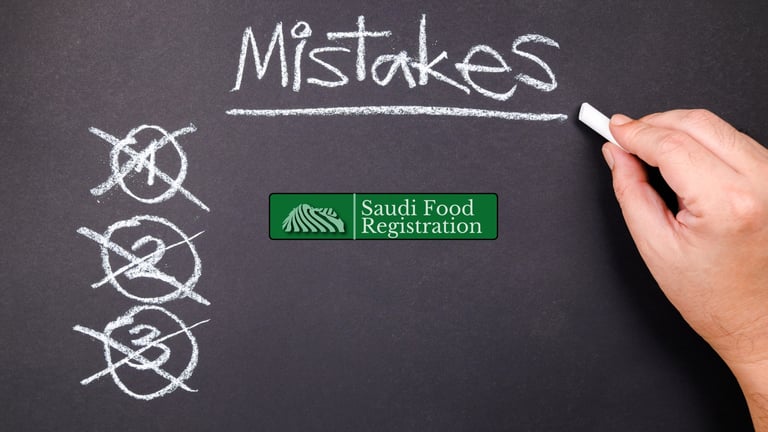2025 SFDA Label Mistakes to Avoid | Saudi Food Registration
Avoid SFDA rejection by fixing common labeling errors. Learn the top food label mistakes in KSA & how to stay compliant in 2025 | Saudi Food Registration.
5/8/20252 min read


KSA Food Label Mistakes That Lead to SFDA Rejection (2025 Guide)
In Saudi Arabia, food product labels must comply with SFDA’s strict guidelines for approval.
While many businesses focus on ingredients or documentation, labeling errors are a common reason for rejection — often leading to costly delays.
This guide outlines the most frequent label mistakes and how to avoid them in 2025.
Why Labeling Matters in SFDA Approval
The SFDA sees food labeling as a reflection of public health standards.
Labels must not only be clear and truthful but also linguistically and technically aligned with local regulations. Even small errors can lead to:
Delays in the product approval timeline
Rejection of entire product shipments
Reapplication with updated packaging, wasting resources
Understanding the common pitfalls is essential to avoid rejection.
Top Label Mistakes That Cause Rejection in KSA
1. Missing or Incorrect Arabic Translation
All information on the product must be available in accurate Arabic — including ingredients, nutritional facts, storage instructions, and usage.
Common mistake: Using auto-translated Arabic or skipping translation entirely.
2. Unapproved Claims or Health Benefits
Labels that claim a product cures, treats, or prevents diseases are strictly regulated.
Common mistake: Including vague claims like “boosts immunity” or “100% safe” without scientific backing or approval.
3. Incomplete Ingredient Lists
The SFDA requires full disclosure of all ingredients, including additives and allergens.
Common mistake: Using umbrella terms like “flavoring” or skipping processing aids.
4. Misaligned Font Sizes or Illegible Text
Readability is part of SFDA’s technical labeling requirements. Font sizes, placement, and contrast must be easy to read.
Common mistake: Shrinking font sizes to fit more branding or text on the label.
5. Missing Expiry Dates or Incorrect Format
Expiry and production dates must follow the Hijri or Gregorian calendar, formatted according to SFDA guidance.
Common mistake: Using international formats or printing expiry dates in code.
6. Barcode or QR Code Errors
Barcodes must be scannable and properly registered. Any broken link or misalignment may cause issues at customs.
Common mistake: Using unregistered or locally non-compliant barcodes.
The Role of Pre-Validation and Expert Review
Labels should be reviewed by regulatory professionals before printing. Pre-validation services often include:
Language and format compliance check
Claim substantiation guidance
Ingredient declaration review
Barcode verification and shelf-life labeling review
Avoiding rejection often comes down to knowing how to spot these issues before submission.
Common Questions Clients Ask
Is Arabic required on all labels for Saudi Arabia?
Can I use the same label in other GCC countries?
Do I need to register my barcode?
What phrases are not allowed under SFDA labeling rules?
We answer these questions and more during our free consultation sessions.
Related Topics You Might Find Helpful
Discover the QA steps to ensure SFDA label compliance
Avoid top SFDA registration rejection reasons
Learn how to respond effectively to an SFDA rejection and fix your application fast.
Prevent Label Rejection Before It Happens
Label rejection is preventable with the right review process.
At Saudi Food Registration, we help businesses ensure their labels meet every SFDA standard — so you can avoid resubmissions and get your products to market faster.
Need help reviewing your food labels?
Contact us now or speak with our chatbot for fast assistance.
